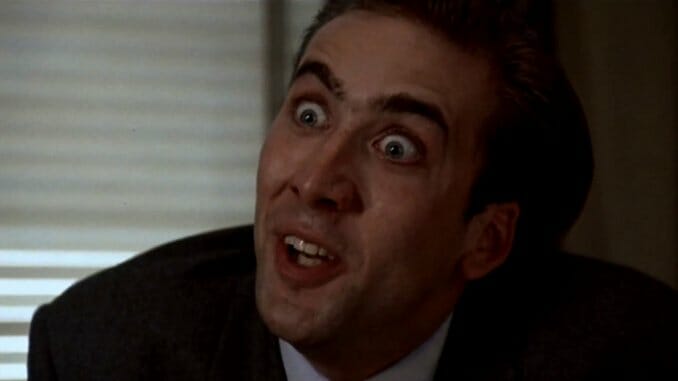You Don’t Say: An Appreciation of Nicolas Cage’s Talky Vampire’s Kiss Performance

Another month, another promised Nicolas Cage movie that isn’t quite as bonkers as that descriptor seems to promise. The Oscar-winner saw his Five Nights at Freddy’s-esque movie Willy’s Wonderland open over the weekend to middling reviews—something that should never happen to a film about one of our great screen presences beating the bejesus out of several murderous animatronic animals. Sure, Cage has been hit and miss, miss, miss, miss in his recent fare (partially because the man’s cranking out half a dozen films a year), but that doesn’t mean his abilities have gone away. Just look at Color Out of Space, Spider-Man: Into the Spider-Verse and Prisoners of the Ghostland—the latter of which has received plenty of notice for a screamed delivery of the evocative word “testicle.” These films have some primo Cage line readings, which aren’t all that make up the actor’s arsenal, but certainly help differentiate between Sleepy Cage and Awakened Cage. It’s no surprise that the middling-to-bad Willy’s Wonderland doesn’t use Cage to his fullest. In fact, it doesn’t let him speak at all.
The film’s star, “the one known for completely committed line readings of even the most ridiculous material, has not a single line of dialogue in this action/horror flick,” writes RogerEbert.com editor/critic Brian Tallerico in his Willy’s Wonderland review. That’s a decision between Cage, director Kevin Lewis, writer G.O. Parsons and God—and it’s seemingly sacrilegious. Counterintuitive, done more out of novelty than good sense. Nicolas Cage is so good at saying words, so endlessly entertaining at the act of speech, that he hosted a Netflix show seemingly crafted around him swearing. Why kick his legs out from under him before a movie even starts filming? Instead of dwelling on this boneheaded move, let’s look back at one of Cage’s most talkative performances in order to remember and appreciate the kind of kitchen-sink acting—where he plays both the human body and its vocal creations like jazz instruments—that made Cage both a movie star and beloved champion of ironists everywhere. That performance comes in 1988’s Vampire’s Kiss.
Ironically, Cage never says the line “You don’t say,” which often accompanies the meme sceenshot taken from Vampire’s Kiss. He sure says a whole lot more, though. One of our picks for the best vampire movies ever made, director Robert Bierman’s feature debut is like watching someone compete in every event in the Olympics of acting. If Hercules was an actor, the labors he would need to accomplish as penance for killing his family would all be contained in Vampire’s Kiss. The dark comedy’s Peter Loew (Cage) is a yuppie, well-versed in vampire lore, who’s seducing a new woman every night and coming apart at the seams. After an encounter with a fanged woman (Jennifer Beals) at his bat-chelor pad, Cage starts going full Renfield-meets-American Psycho as Loew becomes convinced he’s becoming Nosferatu of the Upper East Side.
Apart from the incredible feats of eye-bugging and bug-eating on display—really, Cage eats a bug right in front of us—this manifests in some increasingly deranged line readings. There are certainly the lanky arm gestures that piston out of the electric actor (“Am I getting through to you, Alva?”) and an athletic leap he takes upon a desk, but nothing beats his iconic, essential recitation of the entire alphabet:
That’s not Count Hack-ula. That’s impressive, odd, gripping work punctuated by choreographed gesticulations. It’s a carnival ride of communication.
-

-

-

-

-

-

-

-

-

-

-

-

-

-

-

-

-

-

-

-

-

-

-

-

-

-

-

-

-

-

-

-

-

-

-

-

-

-

-

-








































